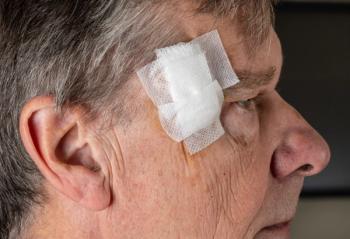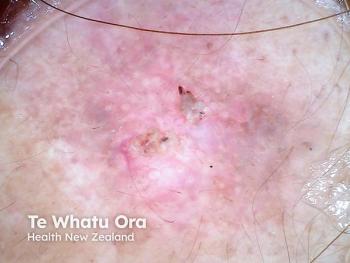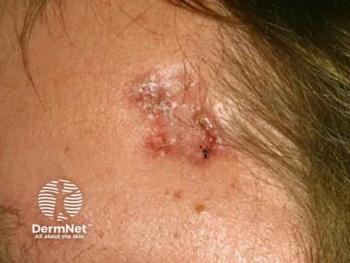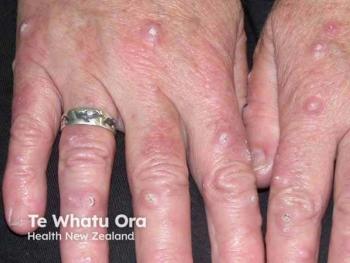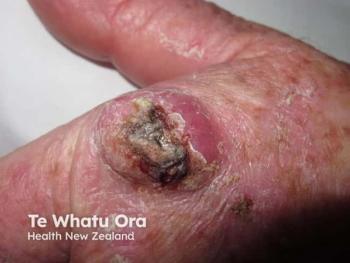
- Dermatology Times, April 2020 (Vol. 41, No. 4)
- Volume 41
- Issue 4
Targeted therapies for advanced basal cell carcinoma
Continued research has produced a number of targeted therapies that provide hope for patients with this rare but sometimes deadly form of nonmelanoma skin cancer.
Until recently, few effective treatment options were available for the treatment of advanced basal cell carcinoma (aBCC), with different chemotherapeutic agents finding only marginal success in some case reports. However, continued research has produced a number of targeted therapies that provide hope for patients with this rare but sometimes deadly form of nonmelanoma skin cancer.
“Before the emergence of molecular targeted therapies, patients with metastatic or advanced basal cell carcinoma were very challenging to treat with truly effective treatments few and far between. The dawn of the hedgehog inhibitors has changed the way we treat our advanced basal cell carcinoma patients,” says Desiree Ratner, M.D., clinical professor, Ronald O. Perelman department of dermatology, NYU Skin and Cancer Clinic, New York, who recently spoke at the ODAC Dermatology, Aesthetic & Surgical Conference in Orlando.
Following the FDA approval of the two hedgehog inhibitors vismodegib (Erivedge, Genentech) and sonidegib (Odomzo, Sun Pharma) in 2012 and 2015, respectively, clinicians could finally offer a novel oral therapy to their patients with advanced basal cell carcinoma.
While vismodegib is approved for locally advanced and metastatic basal cell carcinoma, sonidegib is only approved for locally advanced basal cell carcinoma. Both agents are small molecular inhibitors of smoothened homolog (SMO), which block hedgehog signaling activation. After only having chemotherapy or high dose radiation therapy as medical treatment options, Dr. Ratner says that the oral hedgehog inhibitors are a welcome addition to the clinician’s armamentarium for advanced BCC.
“These targeted therapeutic drugs basically give us a viable treatment alternative for large basal cell tumors that are unresectable or not amenable to radiation therapy,” Dr. Ratner says.
Though having a proven efficacy in patients with advanced basal cell carcinoma, the hedgehog inhibitors also have significant side effects, the most common of which are muscle spasms, hair loss and dysgeusia, but can also include nausea, vomiting, diarrhea, constipation and fatigue, all of which can sometimes be difficult for patients to tolerate. As a result, Dr. Ratner says that clinicians are now suggesting that patients on hedgehog inhibitor therapy take a drug holiday from their treatment protocol to offer relief from the potential side effects while maintaining treatment goals. According to Dr. Ratner, those patients who have intolerable adverse reactions can have up to an 8-week dose interruption drug holiday, and then can start the drug again, without interrupting the long-term therapeutic benefit of the medication.
Those metastatic or advanced basal cell carcinoma patients who had unresectable disease or were not candidates for radiation therapy historically were treated with various regimens of conventional cytotoxic chemotherapies that achieved less than satisfactory therapeutic outcomes.
For most cases, Dr. Ratner says that the hedgehog inhibitors have practically made chemotherapy obsolete for the treatment of advanced basal cell carcinoma.
“We now have treatments for patients with advanced basal cell carcinoma that we could not have imagined 10 years ago that are providing patients with effective and durable remissions of their disease. We don’t know yet whether they are going to be effective in the long term but at least in the short term, they are giving patients a quality of life and a disease-free interval that is longer than they could have previously achieved,” Dr. Ratner says.
Disclosures:
Dr. Ratner reports no relevant disclosures.
Articles in this issue
almost 6 years ago
COVID-19 pandemic requires vigilance, not panicalmost 6 years ago
Microneedling plus radiofrequency effectivealmost 6 years ago
Treatment options for acne expandalmost 6 years ago
An update on antibiotic use for acnealmost 6 years ago
COVID-19: Experts discuss virulence, potential treatments, controversiesalmost 6 years ago
Novel topical foam promising for papulopustular rosaceaalmost 6 years ago
A paradigm shift in squamous cell carcinoma treatmentalmost 6 years ago
Nuogen Pharma: Innovation in the fight against itchalmost 6 years ago
Expert discusses hair loss treatment controversies, concernsalmost 6 years ago
Experts advise caution over early, emerging treatmentsNewsletter
Like what you’re reading? Subscribe to Dermatology Times for weekly updates on therapies, innovations, and real-world practice tips.

